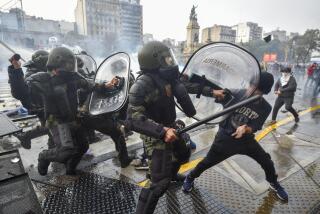In Argentina, Coup Warning Bells Are Silent
- Share via
WASHINGTON — In a world filled with bad news, what a pleasure to watch Argentina as it turns a corner. Serious problems remain, especially economic ones, but for the first time in more than half a century Argentina is establishing a stable political base.
President Raul Alfonsin will soon have completed half of his six-year term. In the past, that would have meant the opening of coup season. President Arturo Frondizi lasted just over three years in office (1958-62) before being overthrown by the military. Arturo Illia (1963-66) was overthrown before he had completed three years. The last Peronist government (1973-76) also failed to make the midway point.
There are no coup warning bells ringing in Argentina today--even though Alfonsin put nine senior military commanders on trial and imprisoned them. In years gone by, to have suggested such a thing would have meant the end of the government. Not now. Alfonsin remains firmly in charge and few doubt that he will complete his term. If he does, that in itself will change recent history. Gen. Juan D. Peron was the last Argentine president to complete a term in office (his first term, 1946-52). Even more striking, Alfonsin will be the first civilian president to complete a full term since Marcelo T. de Alvear (1922-28), 60 years ago.
The main reason for optimism is that the military are in no position even to think of taking power. They are likely to remain in the barracks licking their wounds. No military coup in Argentine history has ever been carried out against the will of the people; every coup has happened because a popular majority seemed to favor it, or was at least willing to accept it. That is decidedly not the case now. No one wants the military back in power, essentially for two reasons.
First, Alfonsin is a genuinely popular president who combines the charismatic gift of a leader with a reputation for devotion to democratic principles and rule of law. Like President Reagan, he has a certain Teflon insulation. Even when his government makes mistakes, he is not blamed for them by his countrymen.
Second, the Argentine people are not likely to forget disasters of the last military government: incompetence in the war against Great Britain; the domestic horrors of the so-called “dirty war,” and the colossal economic mess the generals left behind. Their bungling was on such a scale as to make clear, even to the most myopic, that military rule makes matters worse.
Argentina may have kicked the coup habit for good. A Buenos Aires cab driver said last month: “To our shame, we Argentines stood aside when the military moved against Arturo Illia. We will not do that again. Should the generals move against Alfonsin, they will find 25 million Argentines in the streets to oppose them.”
Another reason for optimism is that the two major political blocs, the Peronist Party and Alfonsin’s Union Civice Radical, have put aside much of their earlier antagonism to collaborate for the common good. This is crucial for the success of Argentine democracy, for Alfonsin could get no measure through the Congress without Peronist votes. A consensus politician by nature, Alfonsin has worked hard to secure Peronist cooperation. So far, he has succeeded. Conventional wisdom suggested that Peronist labor would reject his Austral plan--an austerity program aimed at controlling inflation. A few Peronist labor leaders did reject it but the great majority, including rank-and-file workers, cooperated.
Diego Guelar, a congressman, has explained the position of many Peronists: “One need not fully agree with the Austral plan, or other measures Alfonsin has taken, in order to support them. The country was in a desperate situation . . . . It is a matter of getting behind the President’s efforts to do something, or watch the country collapse.”
Miraculously, the Austral plan worked, reducing inflation from about 30% per month to only 3% over the first year of its operation. Perhaps it worked too well, for if the government can be given low marks for anything, it would be for resting too long on Austral laurels. This was an emergency measure--by definition, of limited durability. A year after it was instituted, it began to spring leaks. Inflation shot up to almost 7% in July. The government has tried new measures to hold the line, but what is really needed is a move from inflation control to a program for sustained economic growth, including measures to attract foreign investment. Senior government officials say they understand this and note that no development program could have worked, nor could any foreign investment have been attracted, without political stability and public confidence. Necessarily, these were the first priority; now that things are going so well in the political arena, more and more attention will be focused on economic growth. One can only add, “and not a minute too soon.”
Even with the government’s full attention, it will not be easy to get the economy moving. Without new foreign investment, Argentina’s development capital must come from export earnings; but because it is making an honest effort to meet its international obligations, most export earnings have been going to service the debt. That put Argentina in a difficult enough position. Then along came the United States with last month’s subsidized grain sale to the Soviet Union, one of Argentina’s principal markets. Such sales further depress the price of Argentina’s export commodities, making it even more difficult to service the debt, leaving even less capital for domestic development.
Washington was not trying to hurt Argentina; rather, it was retaliating for European subsidies and trying to help our own depressed agricultural sector. Yet such U.S. sales, if continued, could have spelled economic disaster for Argentina and possibly aborted the process of democratization. Fortunately, the just-completed trade meeting in Montevideo called on all countries to reduce subsidized agricultural exports.
The problem may now begin to take care of itself. The lesson for the United States nonetheless remains: Washington should more carefully consider all the consequences of trade decisions; if it wants democracy to succeed and wants Argentina to continue to service the debt, it should be assisting that country’s economic development, not impeding it. Argentina has indeed turned a corner, but its new democracy is not likely to survive increasing impoverishment and economic frustration.
As Alfonsin said before the 1983 election: “We must restore political liberties, but we must also keep bread on the tables.” The second is likely to prove more difficult than the first and to be the true test of Argentine democracy.
More to Read
Sign up for Essential California
The most important California stories and recommendations in your inbox every morning.
You may occasionally receive promotional content from the Los Angeles Times.













